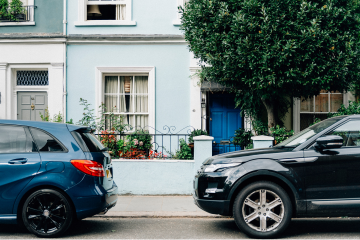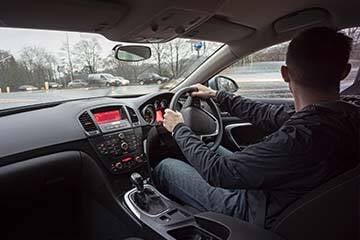Not all of us know when our car insurance is due for renewal, or even the level of cover we have in place. But driving without valid insurance is both irresponsible, illegal and could push your insurance costs up to £1,796* a year on average. You could also get a fine and points on your licence.
Even with car insurance auto-renewal in place, it can be confusing to know who you’re insured with. Or even if you’re insured to drive at all.
So for peace of mind, here's how you find out if your car is insured.
Is my car insured?
You can check if your car is insured by visiting the Motor Insurance Database (MID). The MID holds details of all insured cars in the UK.
Its askMID service is free to use and identifies the make and model of your car as well as whether your car is insured.
There may be an additional fee if you want other details such as the name of the insurance provider.
How do I find out who my car is insured with?
There are several ways to check who your car insurance is with:
- Check your bank statements. Check your bank statements for payments to an insurance company, then contact the insurer for further details.
- Check your emails. Take a look at your emails to see if your insurer has been in touch with you. You can search 'car insurance' in your inbox to find the right messages.
- Find your old quote. Retrieve a quote if you've used a comparison site and see if the details are stored.
- Download a Subject Access Request. You can download this from the Motor Insurer's Bureau (MIB). Subject Access Requests are usually free but the MIB might charge a small fee to cover some admin costs. You need to provide your address and copies of your ID.
Can I check the car insurance status of other cars?
It’s possible to find out if other cars are insured, but only in the event of a car accident.
You need to pay a £10 fee and provide the details of your car registration plate. You also need:
- The third party's registration plate
- The date of the incident
- Your involvement in the accident
- Your email address
When does my car insurance run out?
Look for your renewal date on your car insurance certificate or policy documents - this is when your car insurance runs out. If you can't find either of these, contact your insurer.
Your insurer should send out a reminder about a month before your current car insurance policy runs out. This is usually by email so check your inbox and spam folders.
When your car insurance is due and you get your renewal reminder, your provider also offers you a renewal price. The price they offer may not be the cheapest deal for you. Even if it’s the same price or lower, it's comparing car insurance quotes could save you even more money.
To give you more time to compare, consider temporary car insurance to ensure you aren't driving illegally.
Short-term car insurance can cover you for 1 hour or as long as 28 days. This gives you plenty of time to compare insurers while also ensuring you're still covered and can legally use your car.
How do I check my car insurance renewal date?
Most car insurance policies now auto-renew. This can be helpful as it means you know you’re always covered.
But there are potential downsides. Payments may not always go through so it’s still worth knowing how to check your car insurance expiry date.
If you forget to compare quotes when you get your renewal, you might be stuck with a deal you don’t want. Or a price that’s not competitive.
As the name suggests, all auto-renewal policies automatically renew unless you contact your insurer to cancel.
The term for the renewed policy is likely to be for the same length of time as the previous year - typically 12 months.
It’s not unusual for drivers to be unaware that their policy auto-renews each year. This means they then sign up for another insurance policy with a different provider.
The result is 2 separate policies on 1 car. Not only is this expensive (and unnecessary) but it could make things complicated if you need to make a car insurance claim.
What happens if my car doesn't have insurance?
Driving or owning a car without insurance is illegal.
Driving without insurance is known as an IN10 offence and the conviction can mean higher car insurance costs in the future.
The police could give you a fixed penalty of £300 and 6 penalty points if you’re caught driving a car you're not insured to drive.
And if the case goes to court, you could get an unlimited fine and be disqualified from driving.
The police also have the power to seize, and in some cases, destroy your car.
Even if your car is in your garage, you still have to pay for insurance. This is because of the Continuous Insurance Enforcement legislation.
To avoid this, you need to declare your car off the road with the DVLA. You do this with a Statutory Off-Road Notification (SORN).
If you’re uninsured and don't have a SORN, you could get a penalty - even if you have no intention of driving your car.
A car insurance check is easy to do via the Motor Insurance Database and could save you both money and hassle.
Why should I check my car insurance?
As well as making sure you're legally allowed to drive your car, doing a car insurance check can help you understand your policy better.
It's worth scanning your policy to remind you of the level of cover you have. If you realise it’s not providing the cover you need it’s always possible to ask your insurance company to change it.
It’s also helpful to remind yourself of your car insurance excess and what you need to do in the event of a claim.
How can I save money on a new car insurance policy?
When insurance companies calculate car insurance prices, insurers consider:
-
Your age and occupation
-
What car you drive
-
What car security you have
-
How you use your car
-
Your claims history and no claims bonus
We monitor car insurance prices to help you see when prices go up and down. If it turns out you need to buy a new policy, you can do a few things to save money:
-
Increase your voluntary excess: You have the option of choosing to increase your voluntary excess. But you need to make sure you can afford to do so before deciding.
-
Increase your car's security: The more security your car has, the less at risk it is. Make sure your car is always parked in a secure, well-lit car park and consider a steering lock. You can also add a tracker or alarm.
-
Review how you use your car: Make sure the policy reflects how you use your car. If you commute to work or use the car for business, your costs could go up.
-
Consider downsizing: Smaller cars tend to have cheaper car insurance. More expensive cars are also more at risk as they're more desirable to thieves.
-
Consider your cover type: Third-party cover isn't always cheaper than comprehensive. It's worth looking at both.
For more information, check out our tips on how to lower the cost of your car insurance.
*Confused.com data. July 2022-June 2023. Comprehensive policies with an IN10 (using a vehicle uninsured against third party risks) conviction.







